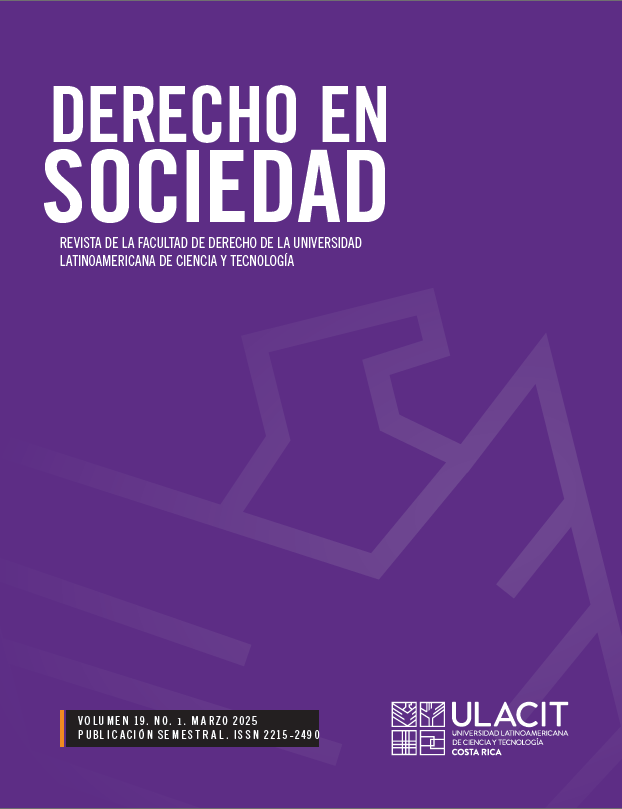
Publicado 2025-03-31
Palabras clave
- global cities,
- post-colonialism,
- urbanization,
- hierarchical systems,
- international relations
- Marxism ,
- normative behavior,
- city resiliency ...Más
Cómo citar
Derechos de autor 2025 Derecho en Sociedad

Esta obra está bajo una licencia internacional Creative Commons Atribución-NoComercial-CompartirIgual 4.0.
Descargas
Altmetrics
Resumen
With the increasing human migration to cities, the relevance of global cities at the international
level is becoming more evident. Nonetheless, a concrete definition of what is needed for a city to
become global has not been formulated. The existing system that identifies cities as global is highly
embedded in the colonial past and perpetuates a hierarchical system born from the colonial legacy.
Therefore, this research paper intersects the significant factors that indexes utilize to evaluate a city
in terms of its global output and highlights the relevant connection of the factors to the colonial
legacy of yore. The social normative conditioning of the citizenry inhabiting these urban centers
and the discrepancy in city resiliency byproduct of a disparity in resource availability. Furthermore,
the inequality in resource allocation has created a perpetuation in the inability to become resilient
to modern transnational problems and transboundary issues, fostering the disparity between
emerging cities and global cities. Finally, this paper seeks to aid in the post-colonial discourse of the
international relations discipline and calls for a conjoint interdisciplinary approach to emancipate
the classification of cities from the contemporary colonial hierarchical system.
Referencias
- Acemoğlu, D., & Robinson, J. (2017, January 30). The economic impact of colonialism. VOX, CEPR Policy Portal. Retrieved December 20, 2024, from https://voxeu.org/article/economic-impact-colonialism
- Boschken, H. L. (2008). A Multiple-perspectives Construct of the American Global City. Urban Studies, 45(1), 3–28. http://www.jstor.org/stable/43198367
- Chul Han, B. (2022). Psico-Política (A. Berges, Trans.; 2 edición). Herder.
- Colombo, M., & Lisciandra, C. (2024). Norms and the City. Transactions of the Association of European Schools of Planning, 8(1). https://doi.org/10.24306/TrAESOP.2024.01.001
- Curtis, S., & Acuto, M. (2018). The Foreign Policy of Cities. The RUSI Journal, 163(6), 8–17. https://doi.org/10.1080/03071847.2018.1562014
- Danewid, I. (2020). The fire this time: Grenfell, racial capitalism and the urbanisation of empire. European Journal of International Relations, 26(1), 289–313. https://doi.org/10.1177/1354066119858388
- Garnier, D. (2022) City-led Science Diplomacy and Delta Cities: The Thwart of a Modern Tale of a New Atlantis[Master´s Dissertation]. Institut Barcelona d’Estudis Internacionals
- Khan, O., & Elahi, F. (2016, March). Ethnic Inequalities in London. Runnymede. https://www.runnymedetrust.org/uploads/images/London%20Inequality%20report%20v3.pdf
- Lake, D. A. (2003). The New Sovereignty in International Relations. International Studies Review, 5(3), 303–323. http://www.jstor.org/stable/3186572
- Mori Foundation. (2021). Global Power City Index 2021. The Mori Memorial Foundation. Recovered 2021, de https://mori-m-foundation.or.jp/english/ius2/gpci2/index.shtml
- Nair, S. (2018, August 6). Introducing Postcolonialism in International Relations Theory. E- International Relations. Retrieved February 1, 2022, from https://www.e-ir.info/2017/12/08/postcolonialism-in-international-relations theory/#:%7E:text=Postcolonialism%20examines%20how%20societies%2C%20governments,rul e%20are%20now%20long%20gone.
- Nasar, A., Lohmeyer, R., Mendoza Pena, A., Hales, M., al Habr, A., & Buckstaff, B. (2021). Global Cities: Divergent prospects and new imperatives in the global recovery. Kearney.Com. Retrieved December 20, 2024, from https://www.kearney.com/global-cities/2021
- Ribeiro, P. J. G., & Gonçalves, L. a. P. J. (2019). Urban resilience: A conceptual framework. Sustainable Cities and Society, 50, 101625. https://doi.org/10.1016/j.scs.2019.101625
- Tucker, K. (2018). Unraveling Coloniality in International Relations: Knowledge, Relationality, and Strategies for Engagement. International Political Sociology, 12(3), 215–232. https://doi.org/10.1093/ips/oly005
- United Nations: Department of Economic and Social Affairs. (2018, May 16). 68% of the world population projected to live in urban areas by 2050, says UN | UN DESA | United Nations Department of Economic and Social Affairs. United Nations. Retrieved December 20, 2024, from https://www.un.org/development/desa/en/news/population/2018-revision-of-world-urbanization-prospects.html
- World Bank (n.d.). The World by Income and Region. Retrieved December 20, 2024 from https://datatopics.worldbank.org/world-development-indicators/the-world-by-income-and-region.html

